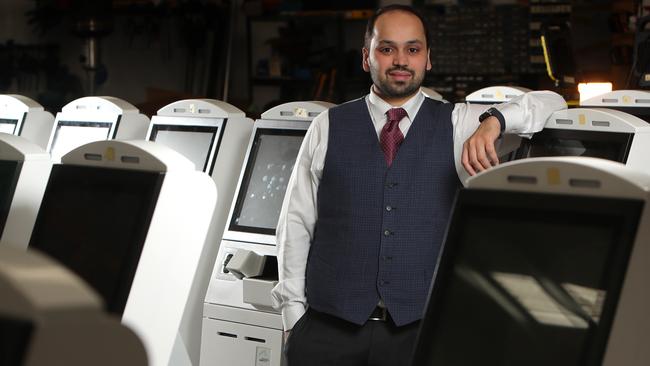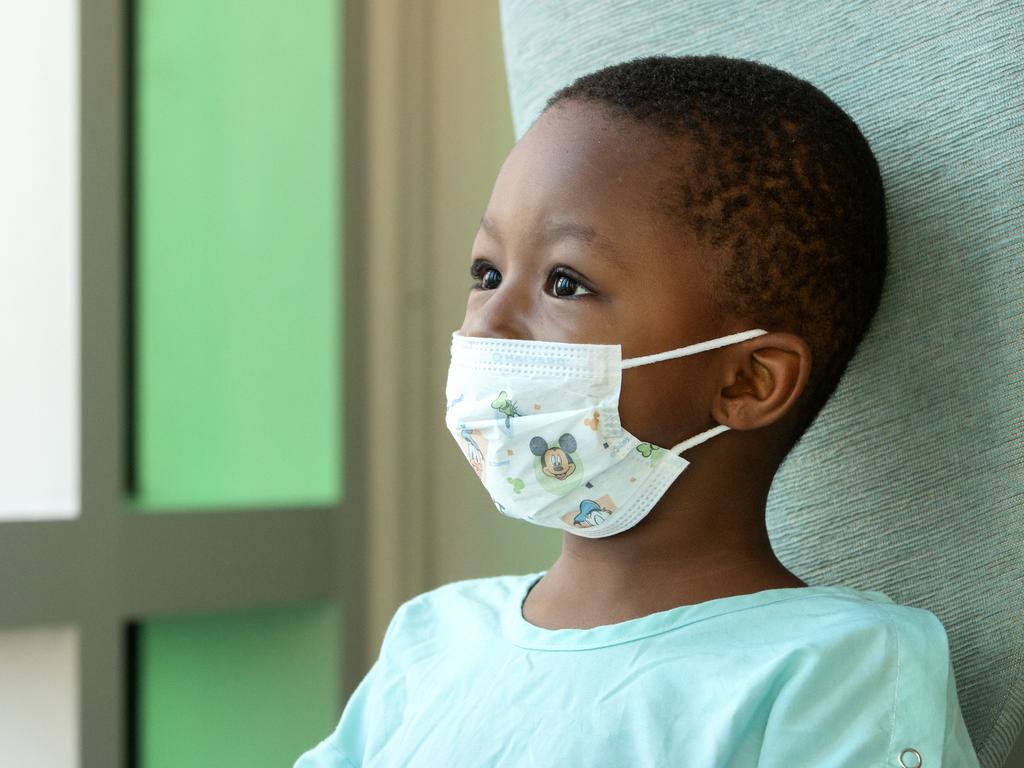Elenium airport technology tweaked to detect COVID-19 symptoms
Luke Sayers joins Fox family to partner a Melbourne tech company that has developed a screening device for COVID-19.

Former PwC chief executive Luke Sayers’s new advisory and investment business has joined the billionaire Fox family to partner a Melbourne technology company that has developed a multifunctional health screening device for COVID-19 and other potential illnesses.
Simply known as Sayers, Mr Sayers’s new firm has forged a strategic partnership with a company known as Elenium, which during the pandemic has pivoted its airport check-in systems to add touchless and voice-activated sensors that can determine if a person is showing symptoms of COVID-19.
Elenium, which is run by Young Rich-Lister Aaron Hornlimann, has recently moved its technology into the aged-care sector through a deal with Nagambie HealthCare, a regional hospital and aged-care provider in Victoria.
Elenium’s touchless kiosk, developed in partnership with Amazon Web Services, enables Nagambie HealthCare employees, visitors and contractors to quickly self-assess their vital health signs, including temperature, respiratory and heart rates before entering Nagambie facilities.
Known as the Elenium Sensor Array, the machine also has a voice-activated microphone that allows the user to be asked questions if abnormal sensory readings are recorded.
“Elenium’s innovative products will play an important global role in not just managing the current crisis but also in shaping what our new society and economy looks like in the future,’’ Mr Sayers, who is executive chairman of his new firm, told The Australian.
“With Elenium’s technology ill workers can recover safely at home and healthy workers can remain in a clean environment. We believe this will be a critical ingredient in enabling confidence and driving economic recovery.”
David Fox, the executive chairman of Avalon Airport — owned by trucking magnate Lindsay Fox and his family — said Avalon had struck a deal with Elenium to have 18 of the company’s kiosks installed at the airport for when flying resumes after the pandemic.
Elenium’s machines can be integrated into existing check-in and bag drop facilities or at security screening checkpoints.
“We are one of the first companies in the country to identify the way of the future for the best interests of our customers, friends and all Australians. When we reopen the airport this brand new technology will give additional comfort to passengers and users of our terminal that they will be safe,’’ Mr Fox said.
“Avalon Airport has seen and viewed this technology knowing it is the future of not only aviation, but safety and security within any format where people gather. This is the technology that will create comfort for Australians going into sports arenas, hospitals, banks, supermarkets, aged-care facilities, government shopfront offices or any public environment where people come in close contact. It will make them feel safe.”
Elenium’s existing customer, Etihad Airways, is trialling the Sensor Array kiosks at its Abu Dhabi airport hub, while Elenium is also in advanced negotiations with a large airport and a critical infrastructure manager, both in North America.
But Mr Hornlimann, who first made his name in the aviation industry for inventing Jetstar’s first text message boarding pass system in 2009, said he wanted half the group’s revenues to come from outside the aviation sector over the next 12 months.
“We are also getting a hospital to validate our own internal testing of the product. Many people in the market in recent months are making claims around temperature checking. But they are not accurate. Our focus on doing it in an accurate way separates us from the pack,’’ he said.
“For example we look at tear ducts, the most accurate place to register your body temperature. One camera even allows us to see where the blood vessels are on your face.”
Since it was founded in 2016, Elenium has raised about $20m, including a $15m Series A funding round last year led by Acorn Capital.
It is now embarking on a Series B funding round that could be worth as much as $30m ahead of a potential sharemarket listing.
Acorn Capital investment director and former UBS banker James Douglas, who is on the Elenium board, said: “This is very much a company that could excel in the public markets and that is definitely an option for the future. It is really clever technology and people can understand its use case and the potential of it. That should resonate with the public markets.’’
“Aaron and the team have taken the technology and repurposed it around touchless access control. The potential of that is substantial.”
Mr Hornlimann said Elenium was also talking to superannuation funds and other institutional investors for the raising. “I would expect there would be more institutional capital coming onto our register as a result of this process,” he said.
“We are well capitalised at the moment. This has allowed us to do the research and development quickly and enter production. This raising is very specific to funding our growth.”






To join the conversation, please log in. Don't have an account? Register
Join the conversation, you are commenting as Logout